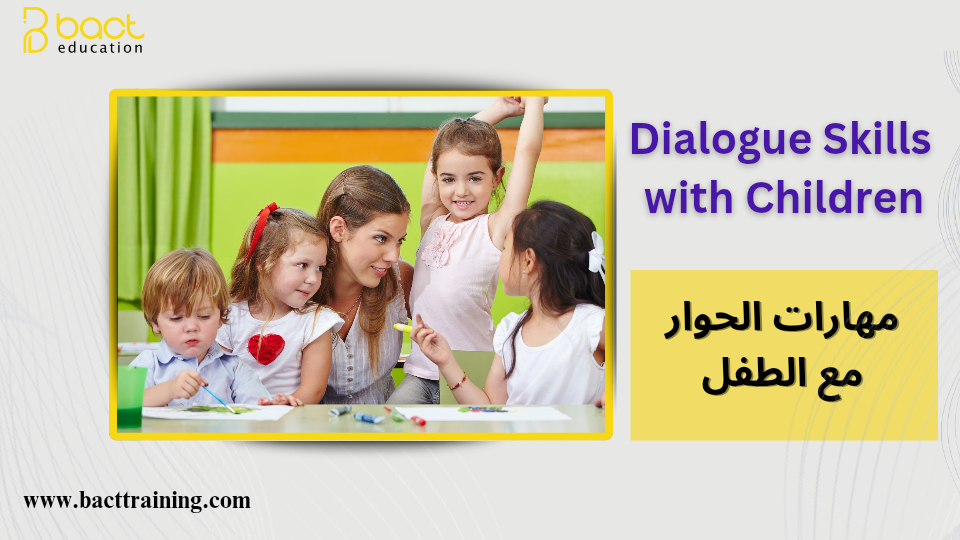Dialogue Skills With Children
Introduction:
In early childhood, a supportive environment is crucial to effectively stimulate a child’s communication skills and facilitate their all-round development. Conversely, limited stimulation can significantly hinder a child’s development. Despite this reality, we observe a significant lack of teacher preparedness to empower children and equip them with conversation and communication skills, particularly in the early years. We also note a lack of resources and training tools that highlight this topic. Therefore, to bridge this gap, it is essential to raise awareness among teachers and education professionals about the importance of conversational skills in early childhood. It is essential to provide them with the basic knowledge and practical tools to ensure that all children in schools and classrooms learn to their full potential.
Definition of Dialogue
“Dialogue is the exchange of ideas, opinions, and feelings between two or more people, leading to an understanding of each other’s positions and enhancing communication between them.“
Dialogue with the child
Dialogue with children is a necessity and a fundamental right, according to the Convention on the Rights of the Child. Article 12 stipulates respect for the child’s opinion: “The child has the right to express his or her views freely in all matters affecting his or her best interests,” and the child’s views shall be given due weight. Article 13 stipulates “freedom of expression through all media and to seek, receive, and impart information and ideas.” Article 14 stipulates “freedom of thought, conscience, and religion”: The child has the right to freedom of thought and conscience and to practice his or her religious beliefs under parental guidance.
Benefits of talking with the child:
- Establishing a rapport between the child and the caregiver, whether the teacher, relatives, or parents.
-
Identifying the problems the child is experiencing, as they emerge through dialogue with the child.
-
Strengthening the bond between parents and child.
-
Building the child’s self-confidence and creating an atmosphere of enjoyment during the dialogue.
-
Expanding the child’s linguistic and cognitive vocabulary.
-
Increasing the child’s freedom in their actions, deeds, and words.
-
Encouraging positive responses to problems and conflicts.
The importance of dialogue with the child
Dialogue is of great importance because it:
– Motivates the child and enriches his motivation and curiosity for discovery and learning.
– Tests questions and ensures his compliance with the information and experiences he encounters.
– Involves him in the learning process and reaching conclusions.
– Captures his attention and prevents distraction.
– Trains him to think, express opinions, and take individual initiatives.
– Strengthens the child’s personality, giving him self-confidence and a sense of his own worth and self-worth.
– Develops his listening and speaking skills.
Dialogue skills with children
-
Dialogue is based on children exchanging their perspectives on a problem, presenting their opinions and ideas, and obtaining opportunities to make a decision or achieve a specific goal. An appropriate atmosphere for presenting and expressing opinions, openness to others, flexibility, adaptability, and objectivity are essential conditions for the success of any dialogue. Hence, the necessity of providing a supportive environment to teach each child dialogue skills, through which they will acquire good behavior with others. Dialogue-based educational methods guide children toward interaction to gain knowledge. They are based on questioning, the exchange of ideas, and the involvement of teachers and students in the learning process. These methods are characterized by:
-
Placing children at the center of the educational process.
-
Encouraging children to respect one another by respecting the opinions of others and appreciating their feelings.
-
Developing a spirit of cooperation and participation.
-
Training them to listen to others, express themselves, and converse.
-
Helping children cope with critical situations and developing conflict resolution skills.
-
Training them to express their feelings, opinions, and ideas without embarrassment.
-
Developing children’s skills in critical thinking, connecting experiences and facts.
-
Developing children’s skills in decision-making and achieving desired goals.
-
Encourages children to accept differences and deal with diversity.
Practical steps to train a child to dialogue

